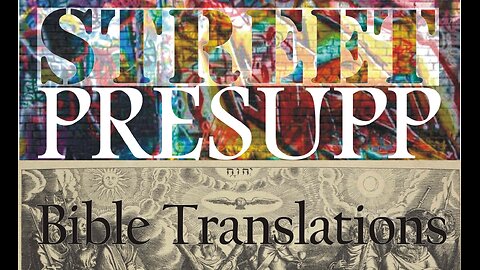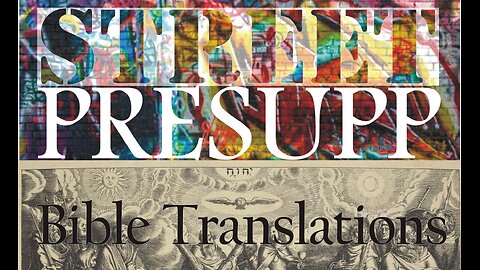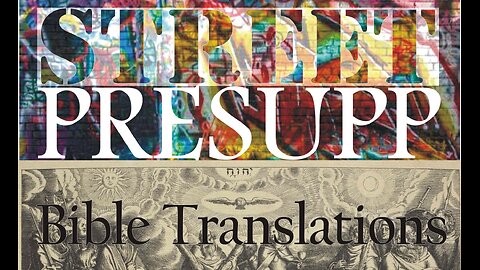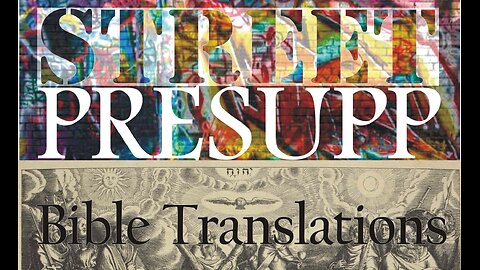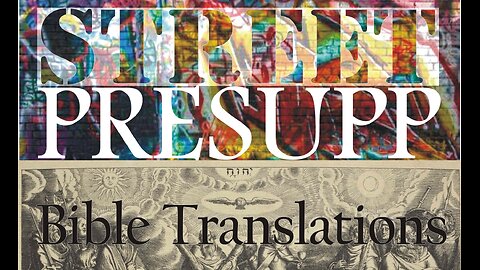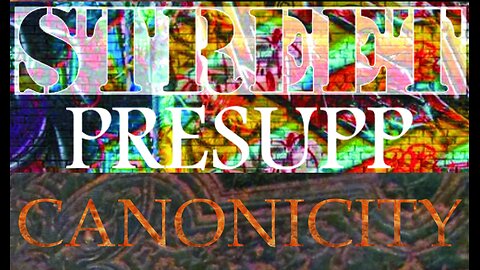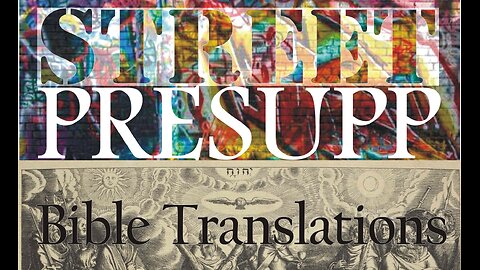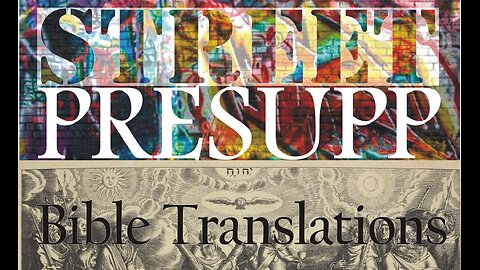
Presuppositional Analysis of Bible Versions
8 videos
Updated 1 year ago
-
Final Authority
EEleazarDupreesKJV translators in their dedicatory epistle were concerned: "that if, on the one side, we shall be traduced by Popish Persons at home or abroad, who therefore will maling us, because we are poor instruments to make God’s holy Truth to be yet more and more known unto the people, who they desire still to keep in ignorance and darkness, or if, on the other side, we shall be maligned by self-conceited Brethren, who run their own ways, and give liking unto nothing, but what is framed by themselves, and hammered on their anvil". We confront the same concerns today. Do we assume the scripture lacked the certainty that these soft sciences provide? Are we to take innumerable and textually varying manuscripts from history, arrange them in certain orders, develop theories and assumptions of origin, evolutionary development and scribal habits, and impose them upon the manuscripts? And say ‘These be thy gods O Israel”? The self attesting nature of scripture is appealed to by John Calvin in his Institutes (Book 1 Ch.VII sec.4-5, Ch.VIII sec.1,V), the Westminster confession (IV, VIII,IX, X), Belgic confession (Articles5 and 7) the 1689 London Baptist Confession, also in the larger Westminster catechism (question4) the 1658 Savoy Declaration #5. These all appealed to the self attesting witness of the Spirit to the scripture, even though, as Calvin asserted, in face of the murmurings of the wicked, certain worthy persons “have not a clear proof at hand to silence them” (reference above). He contends that the Spirit confirms the faith of the godly “inwardly”. The 1689 Confession states the “authority of the Holy Scripture, for which it ought to be believed, dependeth not upon the testimony of any man or church, but wholly upon God”. The Spirit taught these believers inwardly well before the empiricist’s discovery of the “oldest most reliable manuscripts”. Were they misled? The 1689 Baptist confession, and the Westminster confession elevated the Greek and Hebrew originals to the status of final appeal (VII), they continued their assertion by faith in Gods “singular care and providence” by which he “kept pure in all ages” these same Greek (including Mk.16:9-20 and Jn.7:53-8:11) and Hebrew books (Old and New Testament). They made no appeal to handwriting analysis, or scribal habits in their confession regarding final authority. They did not appeal to dating methods as handwriting styles (letter size and punctuation, artistic embellishments etc. comparing to styles on other secular ancient documents with a clear date) types of material used upon which to write and with which to write (ink), the existence of books verses scrolls, as though they provide a clear simple timeline- give or take 50 to 100 years (as opposed to complex events dictating dynamic and unpredictable changes). 2 leading proponents of the critical approach to the New Testament- Kurt & Barbara Aland “The Text of The New Testament” pg6-7 "Yet no real progress was possible as long as the Textus Receptus remained the basic text and its authority was regarded as canonical...Every theologian of the sixteenth and seventeenth centuries (and not just the exegetical scholars) worked from an edition of the Greek text of the New Testament which was regarded as the "revealed text." This idea of verbal inspiration (i.e. of the literal and inerrant inspiration of the text), which the orthodoxy of both evangelical traditions maintained so vigorously, was applied to the Textus Receptus with all of its errors..." https://books.google.com/books?id=Rtc...) I would like to point out some of the same arguments that Josh McDowell used in 'The New Evidence That Demands A Verdict', to prove the authenticity of "the bible" can be, and is used in defense of the KJV. For example: 1. Unique in its influence on civilization pg.15 2. Unique in its influence upon Literature pg.14 (and the English language) 3. Unique in its survival through criticism pg.9 4. Unique in its circulation pg.7-8 His reasonable conclusion was not that this proves the bible is the word of God, but superior to all other books. We apply the same here.31 views -
Historical or Theological Assurance
EEleazarDupreesThis debate shows the truth in Prov.26:4 Answer not a fool according to his folly, lest thou also be like unto him. When we argue assuming the same presuppositions as the atheist we cannot arrive at certain truth. In this case the Evangelical textual critic leaves us with varying degrees of historical probability regarding the entire bible. Some parts are highly probable, other parts are less likely and some they still are not sure. But when challenged on recovering the original readings with a historical approach the Evangelical critic appeals to providence and abandons history. Debate links: • Bart Ehrman vs. James White Debate P2 • Bart Ehrman vs. James White Debate P117 views -
Probability or Providence
EEleazarDupreesRomans 4:21 And being fully persuaded that, what he had promised, he was able also to perform. Acts 2:36 Therefore let all the house of Israel know assuredly, that God hath made the same Jesus, whom ye have crucified, both Lord and Christ. Acts 17:31 Because he hath appointed a day, in the which he will judge the world in righteousness by that man whom he hath ordained; whereof he hath given assurance unto all men, in that he hath raised him from the dead. Colossians 2:2 ...the full assurance of understanding 1 Thessalonians 1:5 For our gospel came not unto you in word only, but also in power, and in the Holy Ghost, and in much assurance... 2 Timothy 3:14 But continue thou in the things which thou hast learned and hast been assured of... Hebrews 6:11 And we desire that every one of you do shew the same diligence to the full assurance of hope unto the end: Hebrews 10:22 Let us draw near with a true heart in full assurance of faith... 1 John 3:19 And hereby we know that we are of the truth, and shall assure our hearts before him. Link to the entire debate- • Ehrman vs Wallace - Can We Trust the ... This corresponding video from our presupp series may assist also- • Probability and Certainty20 views -
-
Omissions or Additions
EEleazarDupreesThe modern textual critic asks the question ‘What did the original authors of the NT actually write?’ And presumes it can only be answered historically and empirically, when it actually cannot, as Bart Ehrman and Dan Wallace (see 1:39:30 • How Badly Was the New Testament Corru... ) both demonstrate. How variant readings arose and how they were distributed through history is inevitably theory bound, and probability based (see 1:24:40, & 1:37:23 • Ehrman vs Wallace - Can We Trust the ... ). The textual variants prove there was no controlled editing. But modern critics contend that if only the reformers had Textual Science and all the new discoveries (like scribal habits) they would not have needed to prematurely conclude that they had any ‘final authority’ like a Greek and Hebrew text (e.g. here- note #4-5, 8 https://www.apuritansmind.com/westmin...) before critics such as themselves brought more light on the issue. Bart Ehrman and James White do agree (as in his KJVO book, pg.42, 152) that the earliest scribes were the worst because they were not professional, and the conditions were very stressful. So, the earliest known manuscripts were closer to the time when copyists made the most mistakes... (Here, starting at 1:10:00 min mark here- • Bart Ehrman vs. James White Debate P1 ; 18:30 min mark here • Bart Ehrman vs. James White Debate P2 . ; 31:25 min mark here- • Ehrman vs Wallace - Can We Trust the ... ) Christians can point to the Spirit inwardly compelling his people (see confessions - https://reformed.org/historic-confess...) as evidence of how the scriptures were preserved before papyrologists ‘graced the church’.14 views -
Textual Variants and Every Word of God
EEleazarDupreesWords mean thoughts https://www.biblegateway.com/quicksea... If we are being scriptural with the word 'word' as in 'every word of God' it means saying. For example: Rom.13:9 "if there be any other commandment, it is briefly comprehended in this saying, namely, Thou shalt love thy neighbour as thyself." Gal.5:14 "For all the law is fulfilled in one word, even in this; Thou shalt love thy neighbour as thyself." Acts 28:25 "...Paul had spoken one word, Well spake the Holy Ghost by Esaias the prophet unto our fathers,26 Saying, Go unto this people, and say, Hearing ye shall hear, and shall not understand; and seeing ye shall see, and not perceive:27 For the heart of this people is waxed gross, and their ears are dull of hearing, and their eyes have they closed; lest they should see with their eyes, and hear with their ears, and understand with their heart, and should be converted, and I should heal them.28 Be it known therefore unto you, that the salvation of God is sent unto the Gentiles, and that they will hear it. (Also see Col.1:5, 2 Thes.3:14, Act.10:44, 13:15, 1 Cor.12- "word of wisdom" and "word of knowledge" would mean a thought or saying). Gen.15:1 After these things the word of the Lord came unto Abram in a vision, saying, Fear not, Abram: I am thy shield, and thy exceeding great reward. This concept goes a long way in understanding many of the variations found historically in the majority of manuscripts and various translations. Or even between the gospel accounts and New Testament references to the Old Testament. It does not pose a problem for the balanced KJV only perspective we are exploring here. Also of note is sometimes the same thoughts are conveyed in different words- “And Naboth said to Ahab, The Lord forbid it me, that I should give the inheritance of my fathers unto thee…for he had said, I will not give thee the inheritance of my fathers”(1 Ki.21:3-4). Another example of different words used to state the same idea is found in 2 Kings 4. “And she said, Nay, my lord, thou man of God, do not lie unto thine handmaid.” (v16) with “she said, Did I desire a son of my lord? did I not say, Do not deceive me?” (v28) When Jesus told Martha "Said I not unto thee, that, if thou wouldest believe, thou shouldest see the glory of God?" in John 11:40 this appears to be a summary of his word to her in v 23-26. (See also Jn.13:10-11, compare 2 Chr.36:22-3 & Ezra 1:1-3) Another example is Acts 10:5 And now send men to Joppa, and call for one Simon, whose surname is Peter: 6 He lodgeth with one Simon a tanner, whose house is by the sea side: he shall tell thee what thou oughtest to do. Compared with Acts 11:13 And he shewed us how he had seen an angel in his house, which stood and said unto him, Send men to Joppa, and call for Simon, whose surname is Peter; 14 Who shall tell thee words, whereby thou and all thy house shall be saved.19 views -
The Framework for History
EEleazarDupreesThe reason we must consider the question of the canon from a Presuppositional Apologetics standpoint is because the question of which books are inspired, and which books belong in the canon is not a historical question it is a theological one. It was an event in history and so history is involved, but history can only provide varying degrees of probable knowledge. What we need is a more sure word of prophecy, we need “Thus saith the LORD”. The research of history presupposes a certain view of reality- of metaphysics and epistemology; a philosophy of history. And the Christian religion provides the only coherent foundation for that. In other words, for there to be such a thing as historical evidence the God of scripture must exist. In order to argue from history, we must already have a view of a particular sort of God in back of reality and not atheism, pantheism or deism. (None of which can justify causation, immaterial invariable laws of math & logic, our minds, or any continuity between the material and immaterial realms.)11 views -
Presuppositions Translations and Texts Intro
EEleazarDupreesIf you are not familiar with presuppositional apologetics check out our series here: • Street Presupp When there are questions of textual variants I argue we should trust what the church from the reformation received by reason of use (providentially and organically as opposed to a council) over centuries (a corporate act over many countries for centuries to this day). And not an 'everyman decides for himself the original text from all the variants- and translates it himself' approach. The church from the reformation onward has declared that the text they were using is "being immediately inspired by God, and by his singular care and providence kept pure in all ages, are therefore authentical so as in all controversies of religion the Church is finally to appeal unto them." note #4-5, 8 here- https://www.apuritansmind.com/westmin... I believe that because of the impossibility of the contrary (presupp). The self attesting nature of scripture is appealed to by John Calvin in his Institutes (Book 1 Ch.VII sec.4-5, Ch.VIII sec.1,V), the Westminster confession (IV, VIII,IX, X), Belgic confession (Articles5 and 7) the 1689 London Baptist Confession, also in the larger Westminster catechism (question4) the 1658 Savoy Declaration #5. These all appealed to the self attesting witness of the Spirit to the scripture, even though, as Calvin asserted, in face of the murmurings of the wicked, certain worthy persons “have not a clear proof at hand to silence them” (reference above). He contends that the Spirit confirms the faith of the godly “inwardly”. The 1689 Confession states the “authority of the Holy Scripture, for which it ought to be believed, dependeth not upon the testimony of any man or church, but wholly upon God”. This is evidence, just not of the empirical soft science sort. The Spirit taught these believers inwardly well before the empiricist’s discovery of the “oldest most reliable manuscripts”. see here https://reformed.org/historic-confess... A nice summary of the field- • English Bible Translations Family Tree20 views
